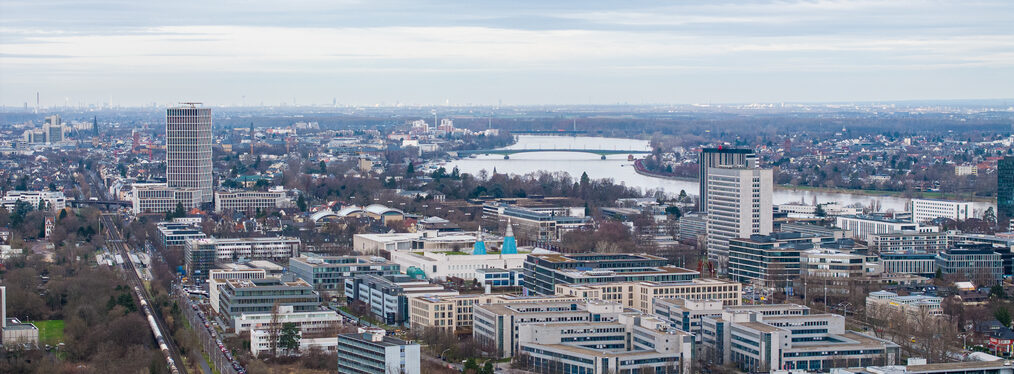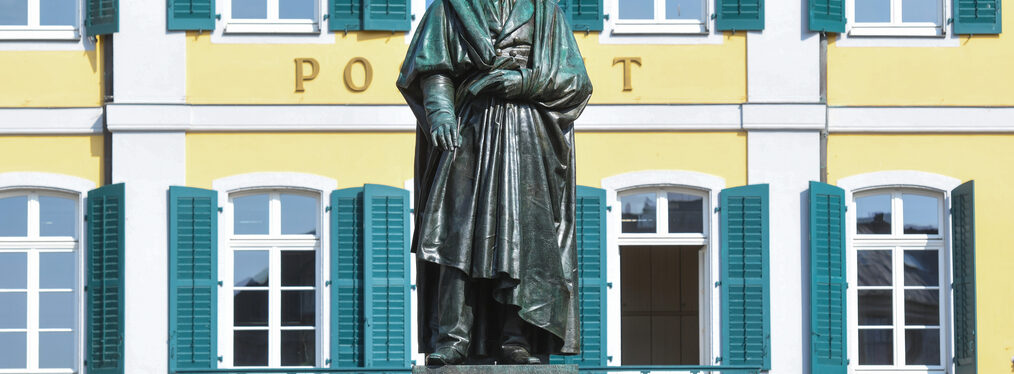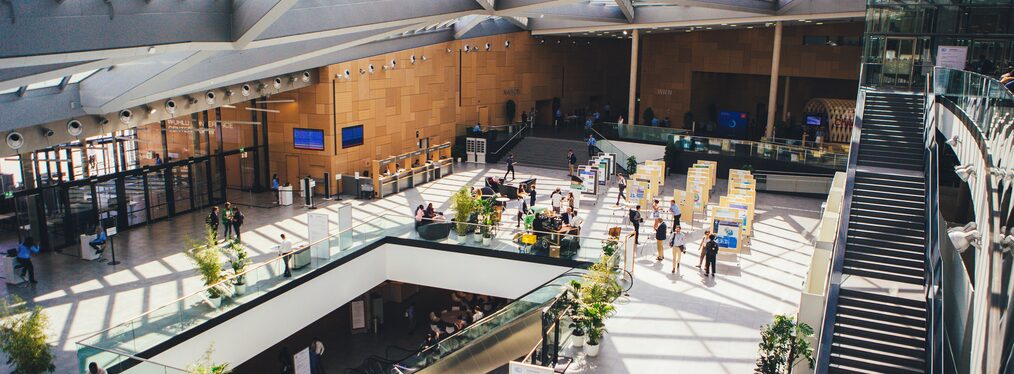Image film
Bonn - Internationality and history
Back in the days of the capital, the flair was strongly characterized by diplomats and employees of political institutions. Now, however, numerous international institutions and their employees contribute to the open and friendly atmosphere. Bonn is not only the German seat of the United Nations, but also a popular host city for high-level international conferences and the headquarters of many German and internationally active non-governmental organizations (NGOs).
This internationality is nothing really new in Bonn. The city on the Rhine can look back on a long and eventful history. Starting with the first settlements in the Stone Age, people from different cultures have lived here on the banks of the Rhine for thousands of years. The settlement of a Roman military camp around 2000 years ago, as part of today's UNESCO World Heritage Site "Lower Germanic Limes", was particularly influential in the development of the city. It is no coincidence that evidence of Roman times can still be found in Bonn's present-day cityscape and numerous relics in museums such as the LVR-LandesMuseum Bonn.
Neolithic hand axes, Roman sculptures, Celtic jewelry and medieval writings are living testimony to the fact that people of different origins have always come, gone and stayed here on one of Europe's most important rivers and transport routes, the Rhine.
Against this backdrop, the proverbial Rhineland way of life developed, which treats other people and life itself with openness, curiosity and tolerance. First of all, people in the Rhineland generally assume that nothing can be changed in the course of events. "Et kütt wie et kütt" - "It comes as it comes", is a common saying in the Rhineland dialect. People are also convinced that everything will turn out well in the end. ("Et hätt noch emmer joot jejange" - It has always turned out well.) This acceptance of the inevitable, coupled with an unshakeable optimism, has accompanied the people of Bonn through eventful times.
Ludwig van Beethoven - Bonn's great son
Certainly, the era as an electoral residence city was one of Bonn's heyday, when magnificent buildings such as the electoral residence palace (now the main university building) or the Poppelsdorf Palace were built. This period is also inextricably linked with the life of Ludwig van Beethoven, the city's great son, whose music achieved world fame. His legacy is highly valued and kept alive in Bonn, as Beethoven was not only a gifted, brilliant artist, but also a passionate advocate of values such as freedom and fraternity that are still valid today. In addition to his world-famous birthplace, the Beethoven Orchester Bonn and the annual Beethovenfest ensure that he is present everywhere in the city and that his immortal music and cosmopolitan spirit have an impact on the world.
Bonn as the cradle of German democracy
The people of Bonn regard the period of the newly founded Federal Republic of Germany as one of the highlights in their city's history (which continues to have an impact to this day). After all, hardly anyone would have predicted that this rather small city on the Rhine at the end of the 1940s would become the cradle of German democracy and the capital of the new Federal Republic after the end of the Second World War. For five decades, (modest) Bonn was the stage on which German politics and international guests of state performed. One downer in the joy of unification with the German Democratic Republic (GDR) was the Bundestag's decision to give Berlin the main role in governing again.
A city reinvents itself
Once again, however, Bonn proved its enormous potential to reinvent itself. In terms of federal politics, the city remains Germany's second political center, and as a "federal city" it is still home to numerous ministries and federal authorities. After a phase of structural change, Bonn has become a sought-after business location for young innovative companies and major global players. The former location for government agencies has become one of the most attractive growth regions in Germany.
In addition, Bonn continues to be involved in international political issues. Bonn is a competent and experienced host for major international conferences such as the United Nations Climate Change Conference COP23 (2017), the largest conference ever to be held in Germany.
Bonn has been the official location of the United Nations since 1996. The number of organizations operating here has since grown to 26, including the United Nations Framework Convention on Climate Change (UNFCCC) and the Secretariat of the United Nations Convention to Combat Desertification (UNCCD). However, it is not only the UN family with around 1,000 employees who are active on the UN Campus in Bonn under the motto "Shaping a Sustainable Future". Rather, this motto also unites around 150 other German and international NGOs. Their constructive cooperation is stimulated by the physical proximity, which creates short distances between sustainability stakeholders.
In addition to commercial enterprises and political institutions, the rapidly expanding scientific institutions are also of great importance for Bonn. Bonn's Friedrich Wilhelm University is one of the few universities of excellence in Germany. The differentiated offerings of various universities and renowned research institutions ensure that Bonn also enjoys great international recognition as a science location.
Given these locational advantages, it is hardly surprising that Bonn is a city with a continuously growing population. On the one hand, this is due to the extraordinary repertoire of job opportunities, which primarily offers highly qualified jobs. On the other hand, this is due to the life-affirming charisma of the city itself and the scenic beauty of the region.
Bonn and Romanticism
Painters, poets and composers such as Heinrich Heine, Victor Hugo and Robert Schumann could not get enough of the river and the unspoiled landscapes with castles, fortresses and vineyards that surrounded it.
Romantic enthusiasm for the Rhine laid the foundations for Rhine tourism, which blossomed as early as the 19th century with the introduction of regular steamboat trips. In the mid-19th century, around one million people a year are said to have enjoyed the beauty of Bonn as "the gateway to the Romantic Rhine" on board a ship. Even today, Bonn and its region are still a "must" for many European travelers.
Bonn has numerous sights to offer, such as the rococo-style town hall or the buildings of high politics. A special attraction is the cherry blossom in Bonn's "Altstadt", as the Inner Nordstadt is affectionately known. For around two weeks in spring, the "dream in pink" attracts crowds of enthusiastic people from near and far to Bonn. Different neighborhoods such as Südstadt with its Wilhelminian style houses or the Bad Godesberg-Villenviertel invite you to take a relaxing stroll. In Bonn, all of this can be reached on foot, by bike or with a short ride on public transport. This makes the city attractive for visitors and residents alike.
Culture and festivals
Cherry blossom, museums, festivals - Bonn has a lot to offer
Those interested in culture will also get their money's worth in Bonn. On the one hand, Bonn has internationally renowned museums such as the Alexander Koenig Zoological Research Museum, the August Macke House Museum, the Federal Art Gallery and the House of the History of the Federal Republic of Germany.
On the other hand, the local theater scene offers something to be proud of. From stand-up comedy and cabaret to classical opera, there is a wide range of stages and theater events in large and small theaters. A number of comedians and actors started their careers on Bonn's stages and still enjoy returning today.
The city is also home to numerous festivals, above all the annual Beethovenfest, which - thanks to the efforts of the Beethoven Orchestra and its General Music Director Dirk Kaftan - bridges the gap between classical and avant-garde music. But fans of other musical genres also get their money's worth at festivals and concerts at very different venues, such as the "Jazztube Bonn" in subway stations, the "Panama Open Air" in the Rheinaue, the "One World Festival" at the Brückenforum in Beuel or the "International Telekom Beethoven Competition" at Telekom's corporate headquarters.
Bonn also has a wide range of gastronomic offerings, with traditional Rhineland pubs with brewery flair and modern club culture. The restaurants also offer down-to-earth regional cuisine and diverse specialties from all over the world.
Bonn is a way of life
Bonn residents appreciate the high quality of life in their city, which offers many spacious green spaces and parks, beautiful Rhine promenades and a good cycle network, which is why people like to spend their free time outdoors.
Bonn residents feel a strong connection to the topic of sustainability. Under the motto "Think globally - act locally", Bonn has set itself the goal of implementing the 2030 Agenda in the City of Bonn. To this end, an urban sustainability strategy was developed and adopted in 2019.
Of course, this cannot be achieved without the involvement and participation of citizens. Citizen participation is expressly desired and is encouraged by the city. This is why the city relies on different ways of participation to drive urban development forward together at many different levels and in different projects. The people of Bonn are convinced that together they can make their lovable and liveable city fit for the future.
They warmly welcome all people who come to Bonn as guests or new citizens to experience why it was already said in the 16th century: "Bonna solum felix" - "Bonn, you happy soil".



